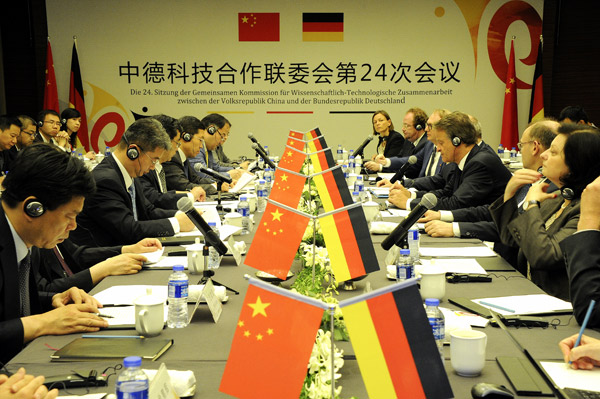
On June 13, 2017, China-Germany Joint Committee on Scientific and Technological Cooperation held the 24th meeting in Taicang, Jiangsu Province. The meeting was co-chaired by Ye Dongbai, Director General of International Cooperation of the Ministry of Science and Technology, MOST, and Volker Rieke, Director General of European and International Cooperation in Education and Research of the Federal Ministry of Education and Research (BMBF), with attendance of representatives from 25 organizations, including MOST, Chinese Embassy in Germany, Ministry of Environmental Protection, Ministry of Housing and Urban-Rural Development, State Oceanic Administration, Chinese Academy of Sciences, National Natural Science Foundation of China, Jiangsu Provincial Department of Science and Technology, Taicang Municipal Government, Tongji University, BMBF, German Embassy in China, German Aerospace Center, Max Planck Society, Helmholtz Association of German Research Centres, Fraunhofer-Gesellschaft, German Research Foundation, and China-Germany Innovation Platform.
DG Ye talked about the progress in implementing MOST’s “Shaping the Future through Science, Technology and Innovation: Strategies for China-Germany Cooperation”. He said China and Germany should play a leading role in innovation to build a new global economy and share responsibilities and opportunities in face of global challenges and new industrial revolution. Under the Belt and Road Initiative, the two countries should capitalize on respective industrial and technological resources to bolster third-party markets. DG Rieke briefed the audience on Germany’s scientific and technological innovation, especially key measures for implementing the federal government’s “New High-Tech Strategy”, as well as the progress of the BMBF’s “China Strategy 2015-2020”. The two sides reviewed their joint achievements in such aspects as smart manufacturing, electric vehicles, energy, urbanization, and big science. Other attendees listed the achievements of China-Germany cooperation in scientific and technological innovation over the past two years, including innovative policies, youth entrepreneurship cooperation, clean water innovation, bioscience platform and marine science cooperation.
Premier Li Keqiang agreed to establish a China-Germany joint funding mechanism during his visit to Germany in early June. The joint committee discussed issues about the establishment of the joint funding mechanism. It also reviewed the progress of the Research Funding 2+2 in 2017 and explored new cooperation models and directions. The two sides agreed that the 40th anniversary of China-Germany cooperation in scientific and technological innovation in 2018 will be a good opportunity to advance the Chinese-German top-level design and establish the joint funding mechanism by drawing on the BMBF’s proposed special fund for cooperation with China, so as to support large projects of great significance in such fields as intelligent manufacturing, aviation, electric vehicles, artificial intelligence, green development, innovation and entrepreneurship, and future transport.
On June 1, Premier Li addressed the “China-Germany Forum: Shaping Innovation Together” in Germany, wishing the first innovation and entrepreneurship week for youth from China and Germany a success. The event kicked off in Jiangsu on June 12. Li Ping, a member of MOST CPC Leading Group and President of Science and Technology Daily, delivered a keynote speech at the opening ceremony of the event. As one of the key activities during the week, the 24th meeting of the China-Germany Joint Committee on Scientific and Technological Cooperation was the first one held outside of Beijing. The joint committee has seen the China-Germany partnership on science and technology evolve from personnel exchanges, joint research, and joint labs to strategic cooperation, mechanism cooperation and regional cooperation. Looking ahead, the two countries should focus on major issues of globalization, jointly support large projects and promote sustainable economic and social development.

